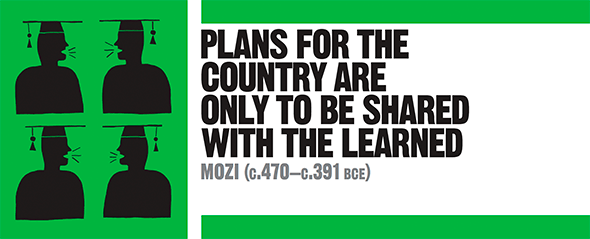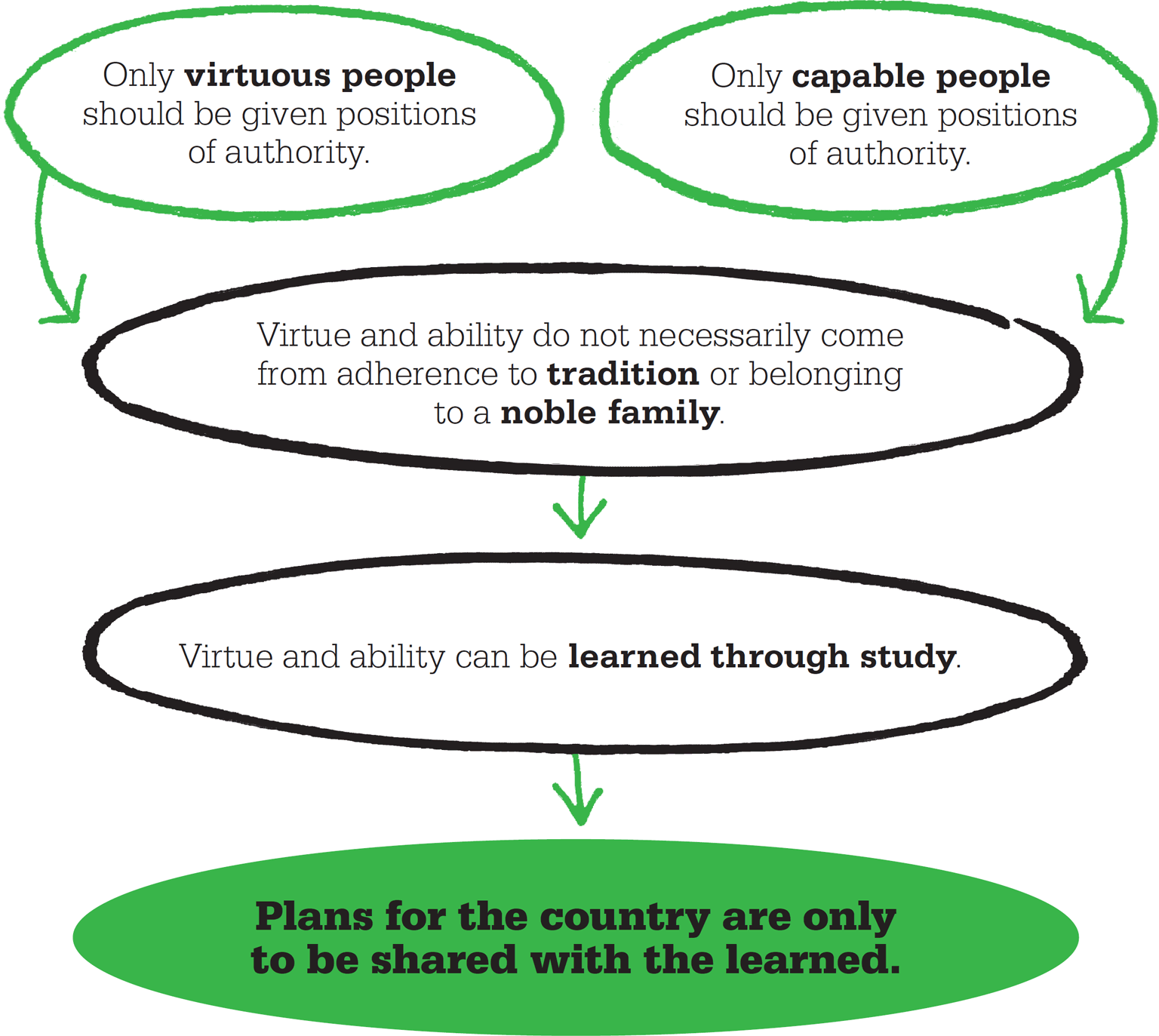
IN CONTEXT
Mohism
Meritocracy
6th century BCE Chinese philosopher Laozi advocates Daoism—acting in accordance with the Way (dao).
5th century BCE Confucius proposes a government system based on traditional values enacted by a class of scholars.
4th century BCE The authoritarian ideas of Shang Yang and Han Fei Tzu are adopted in the state of Qin as the doctrine of Legalism.
372–289 BCE The philosopher Mencius advocates a return to a form of Confucianism.
20th century Mozi’s ideas influence both Sun Yat-Sen’s Republic and the communist People’s Republic of China.
Toward the end of the “golden age” of Chinese philosophy that produced the so-called Hundred Schools of Thought between the 8th and the 3rd centuries BCE, thinkers began to apply their ideas of moral philosophy to the practical business of social and political organization. Foremost among these was Confucius, who proposed a hierarchy based on traditional family relationships, reinforced with ceremony and ritual. Within this hierarchy, however, he recognized the importance of an administrative class to aid and advise the ruler, an idea that was later developed by Mozi.

Both Confucius and Mozi believed that the well-being of the state relied on the competence and dependability of the bureaucratic class, but they differed over the way that administrators should be chosen. To Mozi, Confucius adhered too closely to the conventions of the noble families, which did not necessarily produce the virtue and ability essential to a successful bureaucracy. Mozi felt that the qualities and skills for high office resulted from aptitude and study, regardless of background.

For Mozi, skilled workers such as carpenters could—with training and aptitude—be made into able administrators in government.
A unifying code
“Elevating the worthy,” as Mozi described his meritocratic idea, forms the cornerstone of Mohist political thinking, but it is also linked to other aspects of Mozi’s moral philosophy. He believed in the inherent goodness of people, and felt that they should live in an atmosphere of “universal love.” At the same time, he recognized the human tendency to act in self-interest. This, he believed, often happened in situations of conflict, which arose not from a lack of morality, but from differing ideas of what is morally correct. It was therefore the task of political leaders to unite the people with a coherent moral code that was enforced by a strong and ethical system of government. This code would be based on what was necessary for the greatest good of society, and formulating it required knowledge and wisdom that was only available to the learned.
"Exaltation of the virtuous is the root of government."
Mozi
Mozi’s preference for a ministerial class chosen on merit and ability no doubt stemmed from his own experience of working his way up to high office from humble beginnings. He saw the potential for nepotism and cronyism when the nobility appointed ministers. He also believed that government needed to be run in such a way that it would cultivate the prosperity of the state for the welfare of the people as a whole. Although Mozi attracted a large group of followers, he was regarded as an idealist, and Mohism was not adopted by the Chinese rulers of the time. However, elements of his political thinking were incorporated into later political systems. For example, his emphasis on enforcing a unified moral code was a significant influence on the authoritarian Legalist regimes that arose in the 4th century BCE. In the 20th century, Mozi’s notions of equality of opportunity were rediscovered by Chinese leaders Sun Yat-Sen and Mao Zedong.
MOZI
It is believed that Mozi was born around the time of Confucius’s death, in Tengzhou, Shandong Province, China, into a family of artisans or possibly slaves. Named Mo Di, he was a woodworker and engineer, and worked at the courts of noble families, rising through the civil service to establish a school for officials and advisors. His philosophical and political views gained him a following and the title Mozi (“Master Mo”). Mohists, as his followers were known, lived according to Mozi’s principles of simplicity and pacifism during the Warring States period, until the Qin dynasty established its Legalist regime. After his death, Mozi’s teachings were collected in The Mozi. Mohism disappeared after the unification of China in 221 BCE, but were rediscovered in the early 20th century.
Key work
5th century BCE The Mozi
See also: Confucius • Plato • Han Fei Tzu • Sun Yat-Sen • Mao Zedong
